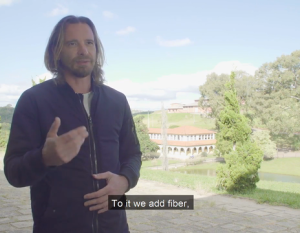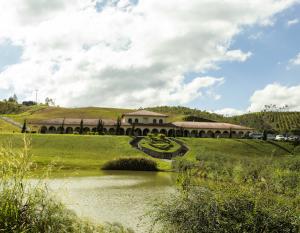Food of World Brings Hope to Africa Through Protein Bars
In the interior of Minas Gerais state, in the east of Brazil, more specifically at the São Miguel Arcanjo Society, home to the FFW project, work is underway to enable production of a super protein bars, that will be donated to communities in need throughout Africa. New Holland Construction’s ties to the Society date back more than 15 years, and have encompassed funding for a range of cultural projects as well as providing equipment to assist in the farm’s infrastructure works.
New Holland is now helping in the initial phase of constructing a facility where the super protein bar will be produced. A New Holland dozer has been donated to the project, and has been set to work on levelling the site in preparation for stage two building works.
The food security issues in Africa are well known: 257 million people in poverty and social vulnerability, accounting for some 20% of the Continent’s population – according to the United Nations Food and Agriculture Organization (FAO) and the Economic Commission for Africa (ECA) – and the level of malnourishment is increasing – some 34.5 million more today vs 2015 figures. But why is this project focusing on Mozambique? Some 30% of the population is currently considered to be malnourished – representing one of the largest pockets of poverty according to the UN. But two more ‘practical’ reasons also motivated the decision, namely the two nation’s shared used of the Portuguese language and well as a ready network of partner institutions capable of mapping a distribution network.
The super protein bar’s aim is to counteract the effects of malnutrition. While full-scale production is yet to begin, clear plans have been laid out for initial trial production.
The food bar will be combined with various nutritious ingredients, but perhaps one of the most important will be Spirulina, an aquatic plant that contains more than 100 nutrients and has received the title of ‘Best Food for the Future’ by the World Health Organization (WHO). Spirulina, and the consumption of microalgae , however, is nothing new, studies show that communities throughout Asia, including China, have used these plants as food sources for over 2,000 years – with increasing global focus being placed on these sources of food since the middle of the 20th century.
The goal, according to Italian missionary Marco Roberto Bertoli, president of the São Miguel Arcanjo Society, is to feed 30,000 children a day. “We will produce the same number of calories, protein and carbohydrates at a much lower cost,” said Bertoli.
Founded in 1998, the São Miguel Arcanjo Society is a non-profit institution that welcomes some 450 young people aged three to 18 as well as providing accommodation for seniors. The society provides regular vocational classes, as well as access to sporting, cultural and leisure activities.
















